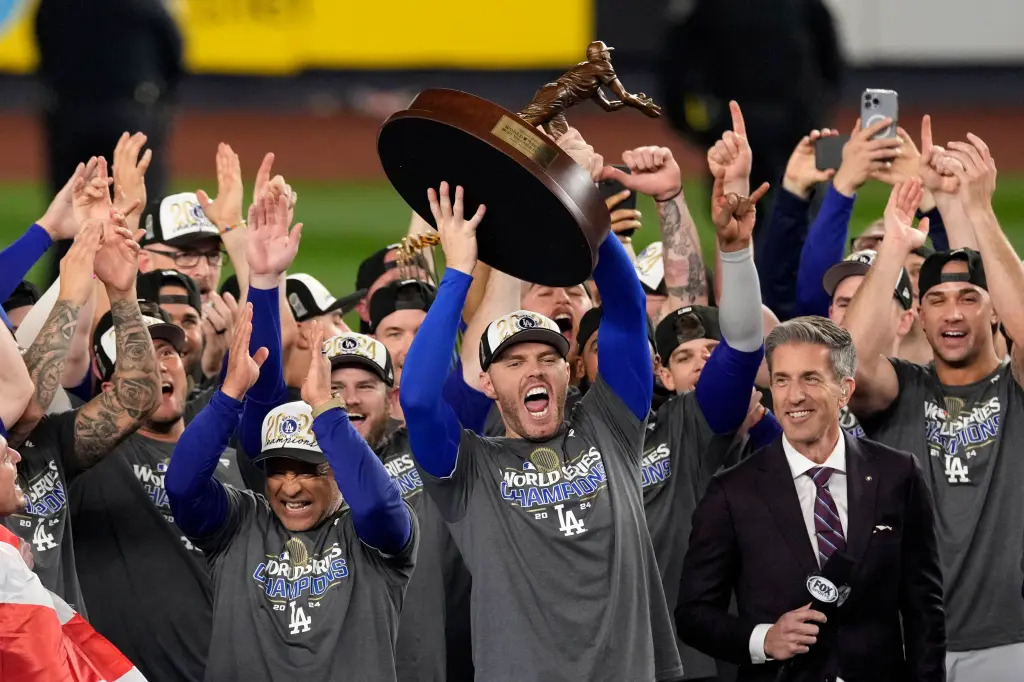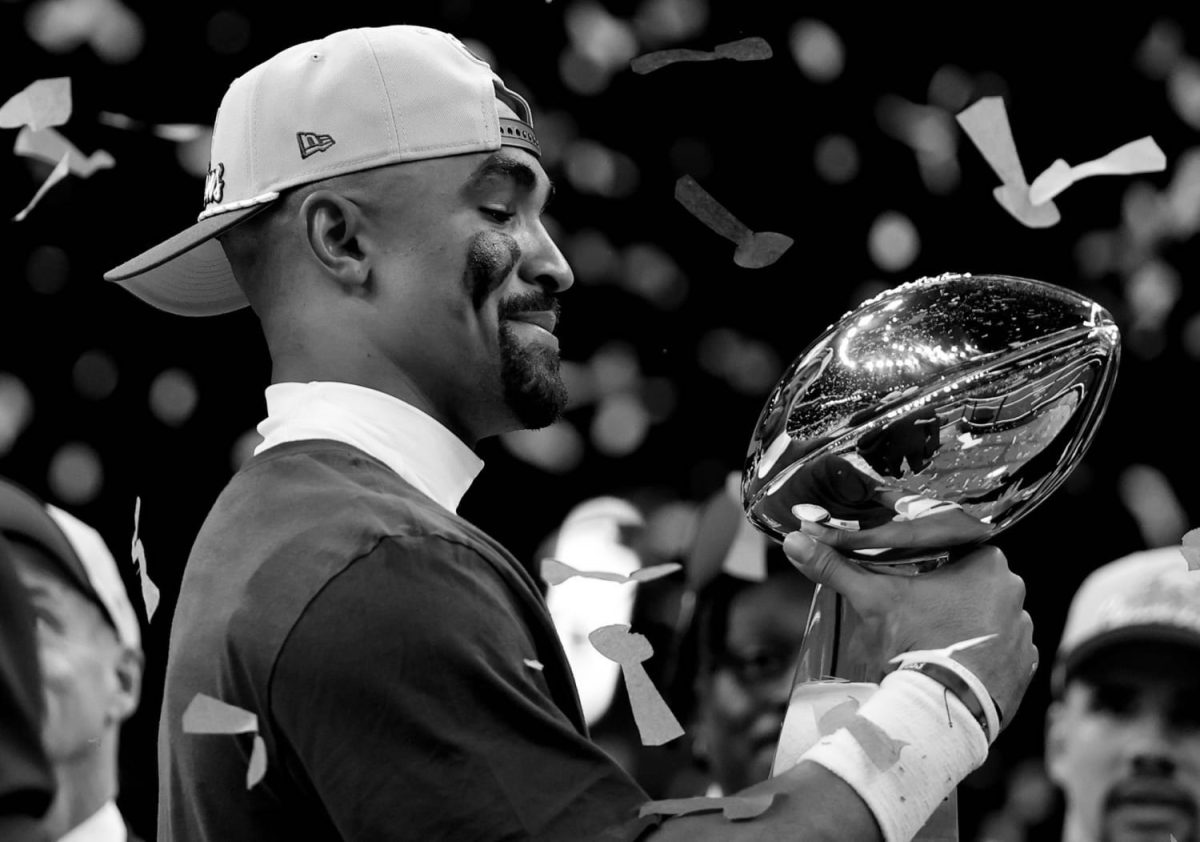New York and Los Angeles: two cities where the stars shine the brightest, mistakes are magnified, and legacies are cemented. For the first time since 1981, the New York Yankees and Los Angeles Dodgers faced off in the Fall Classic. Forty years ago, the Dodgers beat the Yankees 4–2. On Wednesday night, the Dodgers finished off the Yankees in five games. In a series highlighted by some of the best stars the game has to offer, the Dodgers relied on the length of their lineup and dominant bullpen to win the team’s eighth title.
In game one, against two of the best lineups the game has to offer, Yankees ace Gerrit Cole faced off against Dodgers deadline acquisition Jack Flaherty. In a playoff atmosphere that has become so reliant on powerful bullpen arms, Cole and Flaherty provided fans with a throwback pitchers duel. Cole went six strong innings, surrendering only four hits while striking out four. His only blemish happened in the fifth when Dodgers center fielder Kike Hernandez tripled down the right field line and came around to score on a sac fly from Dodger catcher Will Smith. Growing up a Dodger fan, Flaherty was not to be outdone. The righty went 5 1/3 strong innings while giving up five hits and struck out six. His lone mistake was a two-strike curveball to Yankees designated hitter Giancarlo Stanton, the ALCS MVP deposited it 412-feet deep into a sea of Dodger blue in the left field bleachers to give the Yankees a 2–1 lead.
In the bottom of the eight, Dodger’s star designated hitter Shohei Ohtani ripped a double off the top of the right field wall against Yankees reliever Tommy Kahnle. Second baseman Gleyber Torres could not handle right fielder Juan Soto’s throw and allowed Ohtani to advance to third. Dodgers right fielder Mookie Betts then drove Ohtani in on a sac fly to center field, and the score was tied at 2-2.
In the top of the ninth, Torres drove a 99-mph fastball up and into the deepest part of Dodger Stadium, for a moment, he had hit a go ahead home run. But, the ball found the glove of a fan positioned in the front row of the left field pavilion. It was deemed fan interference, Torres was awarded a double and did not score. For the third straight year, game one of the World Series headed to extra innings. The Yankees scrapped across a run in the top of the ninth with some speed on the basepaths, an aspect they do not rely on often. Third baseman Jazz Chisholm singled and stole two bases before coming around to score on shortstop Anthony Volpe’s RBI fielder’s choice giving the Yankees a 3–2 lead going into the bottom half. With two on and one out the Yankees turned to Nestor Cortes. The lefty had not pitched since Sept. 18 because of elbow problems. He got Ohtani to pop out on a first-pitch fastball. Betts was then intentionally walked to set up a left-on-left matchup against the hobbled Freddie Freeman. Freeman sprained his ankle in the last game of the regular season and had been in and out of the Dodgers lineup throughout the postseason. When Freeman connected with Cortes’ first pitch fastball on the inside edge, his ankle felt better than ever.
“It felt like nothing,” Freeman said thinking back on his heroic swing, “just kind of floating.”
The ball soared deep into a frenzy of Dodger fans in the right field bleachers, it was the first walk off grand slam in the World Series since 2011. The Dodgers took back every inch of momentum the Yankees had gained and along with it, a 1–0 series lead.
Going into the series, the overwhelming belief amongst most fans and experts was the Yankees had the advantage of starting pitching. Yankees center fielder Aaron Judge hit 58 regular season home runs; they were supposed to have more power than the Dodgers. Game two proved both assumptions to be far from reality.
Left hander Carlos Rodon got the start on the bump for the Yankees in game two. Opposing him was Dodgers rookie right hander Yoshinobu Yamamoto, who signed the largest contract in MLB history for a player yet to play an inning in the states. Yamamoto came from the NPB — Japan’s pro baseball league, widely regarded to have the second highest level of competition, behind the MLB — and signed for an astounding 12 years, $325 million before the season started.
The Dodgers got on the board first in the bottom of the second when NLCS MVP Tommy Edmund homered off of Rodon to give the Dodgers an early 1–0 lead. In the top of the third, Soto — the Yankees prized offseason trade acquisition and looming free agent — turned on a 95 mph fastball from Yamamoto and sent it deep into the Los Angeles night to tie the score at 1. In the bottom of the third, the Dodgers roughed up Rodon again. With two outs in the inning a single from Betts and back to back home runs from left fielder Teoscar Hernandez and Freeman gave the Dodgers a 4–1 lead. Rodon struggled through 3 1/3 innings before the Yankees turned to their bullpen. After Soto’s early shot, Yamamoto settled in, retiring the remaining 11 batters he faced before being pulled after firing 6 1/3 innings of one run ball while striking out four.
In the top of the ninth, after Stanton smoked a single to left off of third base to make it a 4—2 ballgame, the Yankees loaded the bases with one out. However, their comeback would prove to be futile. Shortstop Anthony Volpe struck out and pinch hitter Jose Trevino flew out to center field to end the game, and give the Dodgers a 2–0 series lead heading to New York.
In game 3, right hander Clarke Schmidt got the ball for the Yankees in front of a frenzied crowd of fans watching the first World Series game in Yankee Stadium since 2009. Despite that, it was once again the Dodgers who jumped out to an early lead. In the top of the first, after Ohtani drew a leadoff walk, Freeman smoked a ball down the right field line and barely snuck it over the wall to quiet the crowd and give the Dodgers a 2–0 lead.
Right hander Walker Buehler got the start for the Dodgers after a regular season marred by injuries and inconsistency. But Buehler was at his best on the big stage, firing five innings of scoreless ball while only allowing two hits and striking out five. The Dodgers tacked on insurance runs in the third and sixth on a single from Betts to score Edmund and a single from Hernandez to score second baseman Gavin Lux and carried a 4–0 lead into the bottom of the ninth. Down to their last out in the ninth, left fielder Alex Verdugo finally got the fans on their feet, launching a two run home run to right-center to get the Yankees on the board. The next batter Gleyber Torres grounded out and the Dodgers went into game four with a 3–0 series lead with their sights set on the first World Series sweep since 2012.
With the Yankees season on the line, they turned to rookie Luis Gil. Yet again, in the top of the first inning, Freeman continued to torment the Yankees pitching staff. Freeman sent a hanging slider mere feet over the right field wall — his record sixth straight World Series game with a home run (dating back to his World Series appearance with the Braves in 2021) to give the Dodgers an early 2–0 lead. In the bottom of the third, the Yankees loaded the bases with one out. After inducing a weak fly out to left, Dodgers reliever Daniel Hudson opened Volpe with an 89 mph slider at the bottom of the zone. Volpe did not miss it, delivering both the biggest swing of his young career and the biggest swing of the Yankees season. From there the Yankees did not look back. After the Dodgers scored two in the top of the fifth on a solo home run from Smith and Freeman with another RBI to his total with a fielder’s choice, Yankees catcher Austin Wells responded in the bottom of the sixth, smashing a solo home run into the second deck in right field. In the bottom of the eighth, the Yankees padded their lead with five more runs, three coming from an opposite field home run by Torres. The Yankees won 11–4 and made their first attempt at getting back in the series, now trailing 3–1.
With their backs against the wall again, the Yankees turned to Cole in game five. After a scoreless top of the first where the Dodgers went down in order, the Yankees bats came alive in the bottom half. Judge lifted a ball deep into the right field seats, his first home run of the series, to give the Yankees a 2—0 lead. The next batter, Chisholm, followed Judge’s lead and deposited a solo home run to right to give the Yankees a 3—0 lead. The Yankees tacked on runs in the second and third, thanks to a Verdugo RBI single and a Stanton solo home run, his seventh of the playoffs, a Yankee record.
All signs were pointing to a game six back in Los Angeles, but then disaster struck for the Yankees in the top of the fifth. Judge dropped a routine fly ball, Volpe made a throwing error, and Cole forgot to cover first on a ground ball to Rizzo. Taking advantage of the mistakes, the Dodgers scored five on a RBI single from Betts, a two-run single from Freeman, and a two-run double from Hernandez to tie the score at 5—5. The Yankees went back ahead in the sixth on a sac fly from Stanton but lost the lead again in the eighth. After loading the bases with nobody out, Lux brought home a run on a sac fly and Betts drove in what would be the games winning run on a sac fly to center.
Buehler came on and got the last three outs of the game for the Dodgers, notching his first career save and securing a 4–1 series win for the boys in blue.
Freeman was named World Series MVP. He finished the series hitting .300, with four home runs and 12 RBIs (tying a World Series record for RBIs).
After finishing the regular season with the best record in MLB, 98–64, the Dodgers overcame every doubt fans and critics alike shared: could the bottom of their lineup produce? Did they have enough starting pitching to survive in a seven game series? Would their bullpen run out of gas? The Dodgers decisively answered every question, and their 2024 season will be etched in the record books for all eternity.











